Share
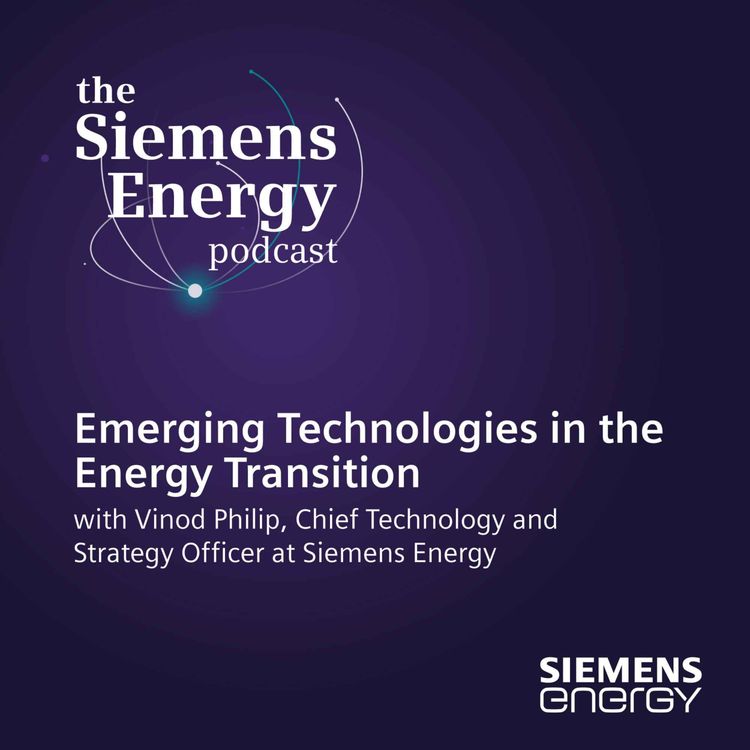
The Siemens Energy Podcast
Emerging Technologies in the Energy Transition with Vinod Philip, Chief Technology and Strategy Officer at Siemens Energy
To move the world towards a carbon-neutral energy economy, technological innovation is a necessary asset. The systems required to implement hydrogen infrastructure, or store the electricity generated through solar power, are in many ways still in their infant stages. Success in the renewable sector depends on the further development of these technologies.
On this episode of the Siemens Energy Podcast, Vinod Philip, Chief Technology and Strategy Officer at Siemens Energy, discusses several areas where current technological developments hold promise for a cleaner energy future. Vinod views the following five technologies as keys to reaching carbon neutrality:
- Energy storage
- Hydrogen energy and infrastructure
- Data analysis and digitalization
- Energy grid resiliency
- Long-term technologies, such as nuclear fusion
To bring these developing technologies to fruition, inter-agency cooperation is essential. The financial incentives and political will required to implement the fundamental infrastructure to these technologies pose the greatest challenge to success, according to Vinod. As he says, the available technology is not the problem. Rather, it is the ability to implement this technology effectively that may mark the difference between success and failure in the pursuit of carbon neutrality in the coming decades.
If you enjoyed today’s show, please leave a 5-star review. For more information and links to all the resources mentioned in today’s episode, visit Siemens-Energy.com
More episodes
View all episodes
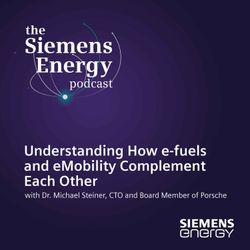
20. Understanding How e-fuels and eMobility Complement Each Other with Dr. Michael Steiner, CTO and Board Member of Porsche
19:40||Season 1, Ep. 20While electric vehicles and eMobility get a lot of attention these days, it’s important to see how e-fuels complement eMobility and are helping to address decarbonization in the immediate future.Dr. Michael Steiner, CTO and Board Member of Porsche, works with both e-fuels and eMobility on a daily basis and that’s why we wanted to speak to him on the latest episode of the Siemens Energy Podcast. When he’s not working on these issues at work, he’s thinking about them when driving: he has a fully electric Taycan and an old-fashioned 9/11 GT3, which is conventionally fueled.Host Amy Pempel starts the conversation by having Dr. Steiner explain the why of e-fuels: that they allow us to use our existing car fleet while addressing decarbonization.Amy and Dr. Steiner also discuss:The current renewable/fossil energy gap in EuropeHow e-fuels are madeDetails of a Porsche and Siemens Energy e-fuel collaboration in ChileYou’ll also hear Dr. Steiner’s explanation of how e-fuels help power many different industries besides cars. Enjoy!If you enjoyed today’s show, please leave a 5-star review. For more information and links to all the resources mentioned in today’s episode, visit Siemens-Energy.com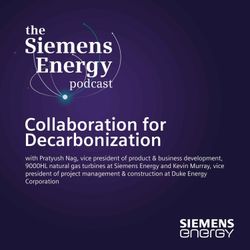
19. Collaboration for Decarbonization with Pratyush Nag of Siemens Energy and Kevin Murray of Duke Energy Corporation
28:43||Season 1, Ep. 19An important strategy in decarbonization is to find more carbon-neutral ways to use current infrastructure and technology. Efficient gas turbines with fast ramping capabilities that support renewables, and that set the stage for using low and no-carbon fuels in the future, is one of those technologies. Two people who have been involved on the ground level of just such a project are Pratyush Nag, VP of Product & Business Development, 9000HL Gas Turbines at Siemens Energy, and Kevin Murray, VP of Project Management & Construction at Duke Energy. They are our guests for this episode of the Siemens Energy Podcast.The conversation begins with Kevin explaining why Duke Energy has been interested in renewable solutions since 2005 and the progress it continues to make in this area.Pratyush and Kevin also discuss:Why utilities should foster innovationHow the turbine station both parties are working on can serve as a template for other companies, not just Siemens Energy and Duke EnergyYou’ll also hear Pratyush and Kevin remark on the resilience of their teams during the pandemic.If you enjoyed today’s show, please leave a 5-star review. For more information and links to all the resources mentioned in today’s episode, visit Siemens-Energy.com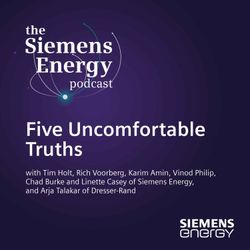
17. Five Uncomfortable Truths
16:25||Season 1, Ep. 17The journey towards slowing climate change requires a reckoning with reality. There are truths about the current state of the global energy grid and its technological innovations that must be acknowledged before a meaningful path forward can be created.On this episode of the Siemens Energy Podcast, we hear from many voices within Siemens Energy about the uncomfortable nature of the solutions to climate change and what that means for the work that still needs to be done to combat it.Contributors to this discussion include:Tim Holt, Member of the Executive Board and Labor Director at Siemens EnergyRich Voorberg, President at Siemens Energy North AmericaArja Talakar, SVP Industrial Applications Product & CEO at Dresser-Rand - a Siemens BusinessKarim Amin, Executive Vice President Generation and Member of the Executive Board of Siemens EnergyVinod Philip, Chief Technology & Strategy Officer at Siemens EnergyLinette Casey, Director - Power Systems Development at Siemens EnergyChad Burke, Senior Vice President of Power System Sales at Siemens EnergyWe can only solve a problem when we’re honest about the challenges it poses. Reckoning with the uncomfortable truths of technology, infrastructure, finance, and the climate is the first step in enacting meaningful solutions.If you enjoyed today’s show, please leave a 5-star review. For more information and links to all the resources mentioned in today’s episode, visit Siemens-Energy.com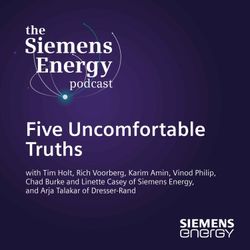
16. Viewing Diversity as an Energy Asset with Linette Casey, Director of Power Systems Development at Siemens Energy
21:40||Season 1, Ep. 16The energy industry has historically been dominated by men. This has not only created a struggle for diverse voices seeking to become leaders within the energy sector, but it has been a detriment to the energy industry as a whole. Without diverse perspectives, the industry has been limited in its ability to come up with creative solutions to longstanding problems.Linette Casey, Director of Power Systems Development at Siemens Energy, joined this episode of the Siemens Energy Podcast to talk about her experience as a woman working to transform the energy sector, and how a greater focus on diversity in recent years has opened up a world of possibilities in the quest to transition to more renewable energy sources.Customers have come to demand greater social and environmental responsibility from energy producers, and Linette has been a leading voice in encouraging future energy leaders to rise to the occasion. The steadily growing range of perspectives within the next generation of energy leaders has the potential to create not only a more inclusive industry, but a more resilient and reliable energy supply chain. This diversity is not mere window dressing, but a vital asset in the renewable transition. If you enjoyed today’s show, please leave a 5-star review. For more information and links to all the resources mentioned in today’s episode, visit Siemens-Energy.com.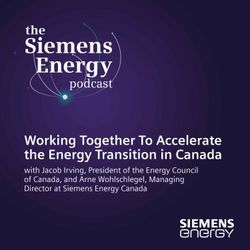
15. Working Together To Accelerate the Energy Transition in Canada with Jacob Irving, President of the Energy Council of Canada, and Arne Wohlschlegel, Managing Director at Siemens Energy Canada
46:11||Season 1, Ep. 15As some of the world’s leading hydrocarbon producers grapple with how to transition from fossil fuels to renewable energy, one nation leads the charge: Canada. Despite having already significantly cut carbon emissions, transitioned to renewable infrastructure, and outlined concrete steps to reach total carbon neutrality, Canada’s success in producing clean energy is a largely unknown tale.Jacob Irving, President of the Energy Council of Canada, and Arne Wohlschlegel, Managing Director at Siemens Energy Canada, are seeking to change that. Their collaboration is an effort not only to bring private industry and public institutions together to address modern energy needs, but to educate the public on the potential for success in the renewable energy transition.On this episode of the Siemens Energy Podcast, Jacob and Arne recount their work in overcoming the logistical challenges facing renewable energy infrastructure and the struggle to create the popular demand necessary to implement this infrastructure on a large scale.Notable topics of Jacob and Arne’s discussion include:The Canadian government’s responsiveness to a quickly changing energy sectorCreating affordable renewable energy sourcesEducating the public on the viability of clean energyPartnering with Indigenous Canadians to create a more robust energy gridIf you enjoyed today’s show, please leave a 5-star review. For more information and links to all the resources mentioned in today’s episode, visit Siemens-Energy.com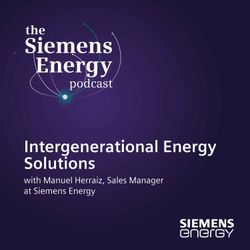
14. Intergenerational Energy Solutions with Manuel Herraiz, Sales Manager at Siemens Energy
25:31||Season 1, Ep. 14The global transition to clean energy is a long-term commitment, not a short-term cause. As such, many of the current leaders in the push toward renewable sources will leave the industry and retire long before the transition is completed. In order to achieve carbon neutrality, future energy leaders will need to take up the mantle and carry on the work that the prior generation started.Manuel Herraiz, Sales Manager at Siemens Energy, is one such future leader. He joined this episode of the Siemens Energy Podcast to discuss some of the challenges facing this generational transition, and how he and his colleagues might overcome them. Manuel addresses:The tension between different generations’ approaches to energyThe need for cooperation between agenciesThe challenges facing infrastructure transformationThe need for society at large to change its habits around energy consumptionManuel and his fellow leaders in energy are just one piece in the larger puzzle in the pursuit of carbon neutrality. Only through cooperation, regardless of age, background, or employer, can the pieces come together to solve the issue of climate change in a timely manner.If you enjoyed today’s show, please leave a 5-star review. For more information and links to the resources mentioned in today’s episode, visit Siemens-Energy.com.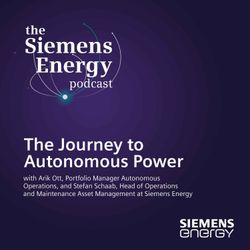
13. The Journey to Autonomous Power with Arik Ott and Stefan Schaab of Siemens Energy
24:23||Season 1, Ep. 13While autonomous vehicles get a lot of press attention, autonomous and remote technology are making great strides in many other sectors as well, notably in power and energy generation.Siemens Energy team members Arik Ott, Portfolio Manager Autonomous Operations, and Stefan Schaab, Head of Operations and Maintenance Asset Management, deal every day with the questions of autonomous operations, so they are ideal guests for this episode of the Siemens Energy Podcast. Host Amy Pempel begins the conversation by having Arik parse the differences between autonomous and remotely-operated power plants. Stefan then adds some context as to why this is just as much a question of a change in the job marketplace (fewer available skilled workers) as a desire to innovate with existing technology.Amy, Arik, and Stefan also discuss:The role of machine learning in aiding and improving automationCalming the fears of a workforce that fears that automation will cost them their jobsHow critical systems that formerly needed on-site monitoring can now be monitored remotelyArik and Stefan also emphasize that these changes are part of a journey that will take time but that is inevitably happening.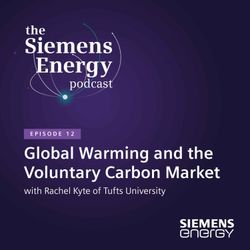
12. Global Warming and the Voluntary Carbon Market with Rachel Kyte of Tufts University
24:08||Season 1, Ep. 12There are so many changes happening in energy transformation and climate policy. One of the best ways to keep learning about issues in this space is to speak with thought leaders who are helping to spread awareness.One of those thought leaders is Rachel Kyte, Dean of The Fletcher School at Tufts University. Rachel has extensive experience in sustainability in the private sector and with the World Bank. That’s why we are thrilled to have her as a guest for this episode of the Siemens Energy Podcast.Host Amy Pempel begins the discussion by having Rachel articulate the “why” for decarbonization—not just economically, but ethically.Amy and Rachel also discuss:The historic responsibility of industrialized countries to deal with de-carbonizationThe corresponding responsibility of fast-growing countries to be thoughtful in how they use and deploy energyThe voluntary carbon marketYou’ll also hear Rachel’s concerns about vested interests that are trying to trade on energy poverty instead of taking a serious look at better solutions for all stakeholders.If you enjoyed today’s show, please leave a 5-star review. For more information and links to all the resources mentioned in today’s episode, visit Siemens-Energy.com